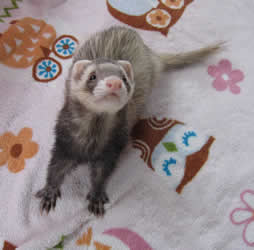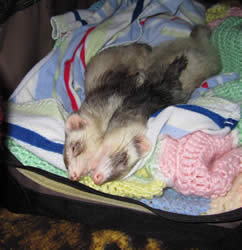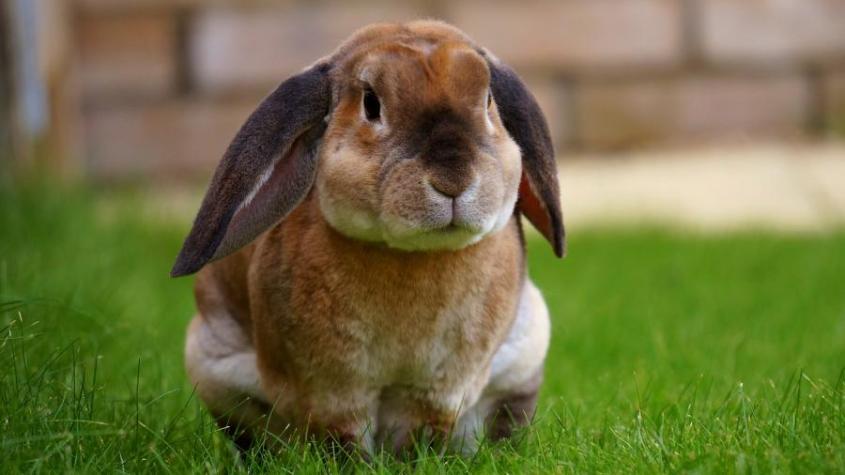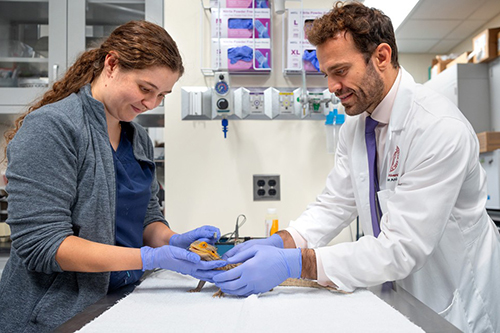Your scheduled visit to the Exotic Pet Services at the Cornell University Hospital for Animals begins with check in at the reception desk. Following a small amount of paperwork, you will be greeted in the waiting room by one or two students currently in their exotic pet rotation and brought to a private examination room.
 The students will inquire about your pet's history. They may perform a physical examination of your pet - an invaluable experience for their education and development. We appreciate your patience and understanding in allowing these future veterinarians to interact with you and your pet.
The students will inquire about your pet's history. They may perform a physical examination of your pet - an invaluable experience for their education and development. We appreciate your patience and understanding in allowing these future veterinarians to interact with you and your pet.
The students will then leave to consult with a resident or faculty member about the history, physical examination and recommendations for case management. The faculty member or resident will accompany the student back to your examination room to examine your pet again and discuss the diagnosis, next steps, cost and logistics.
Often, you will be asked to leave your pet in the care of our students so that we can begin appropriate testing, which can include blood tests and imaging studies. Given our busy schedule and consultations with other specialists regarding your pet's care, you may be asked to return to discuss our findings later in the day. Some animals with more serious conditions will be admitted to the hospital for further monitoring and treatment.
When nature needs a little help...

For nearly six years, Buddy was an active, healthy ferret. But when the ultimate power outage occurred – the natural electrical system in his heart stopped functioning properly – his heart rate became too low, a potentially life threatening condition. With the natural rhythm gone awry, owner Tara Fish looked to experts at the Cornell University Hospital for Animals for a man-made cadence.
Drs. Jamie Morrisey and Ricardo DeMatos, from the Exotics Service, and Dr. Marc Kraus from the Cardiology team, diagnosed the three-pound family pet with a third-degree heart block. Considered to be a complete obstruction, Buddy’s failing heart was responsible for the once spry ferret’s current difficulty completing simple tasks, like walking and breathing. Effectively, Buddy’s heart was beating at only 30 percent of what it usually would, making it difficult for Buddy’s brain and organs to get the blood and oxygen needed for optimal functioning.
“It happened so suddenly,” said Fish, who is a lab technician with the USDA. “He was playing as he usually did, and collapsed without warning. He was breathing very fast, so I knew something was wrong.”
With the initial diagnosis, medical and surgical treatment options were discussed with the owner. Considering the high risk of pacemaker implantation and novelty of the procedure in the species, the team and Fish decided to treat medically, administering medicine and observing. For a few months, Buddy’s heart rate was manageable and he was holding his own, according to Fish, but then, just as unexpectedly, the sable bundle of fur took a turn for the worse and surgery was scheduled. A team of veterinarians, including exotics specialists, cardiologists, and surgeons worked together to implant a pacemaker that was originally designed for a human and is the size of a silver dollar.
“The first 24 hours after the surgery were a bit rough, but Buddy is a fighter,” said Fish, who was able to visit him in the recovery area and took him home to his sister, Bella, two days later. “There were definite risks involved, and I knew it could have gone either way.” Buddy loves his life, so I decided to give him that chance. Who wouldn’t do that for someone they love?”
Fish has seen the wire from the pacemaker that is directly linked to Buddy’s heart and the generator in his belly on the x-rays. Listening to his heart beat with her stethoscope – something she does regularly – is the ultimate reassurance, though.

“I’m thankful that there are people who realize life-saving surgeries and treatments should not just be for people,” said Fish. “I will continue to do whatever I can for both of my ferrets. They’re my babies”
Indeed, this wasn’t Buddy’s first surgery with Cornell. In July of 2010, he had an adrenal gland and his spleen removed. Currently, Buddy’s sister is undergoing chemotherapy treatment for intestinal lymphoma. Bella was first diagnosed in June of this year, after emergency surgery for an intestinal rupture and peritonitis. So far she is doing quite well.
“It’s been quite an emotional roller coaster over the last year or so, and I have had to make some very difficult decisions for Buddy and Bella, but I am so thankful for the caring, and professional staff at the Cornell University Hospital for Animals, especially the Exotics department; they been very helpful, for sure,” said Fish.
Some people might ask: Why ferrets? The answer comes easily to Fish: “They have taught me so much, and they bring a level of quality and joy to my life. Their heartwarming personalities are amazing. It doesn’t matter what kind of day I’m having, as soon as I see their curious, bright eyed, little faces, it makes me smile. They really do leave tiny pawprints on your heart.”





 Diagnosis and treatment of dental disease in rabbits and rodents
Diagnosis and treatment of dental disease in rabbits and rodents The students will inquire about your pet's history. They may perform a physical examination of your pet - an invaluable experience for their education and development. We appreciate your patience and understanding in allowing these future veterinarians to interact with you and your pet.
The students will inquire about your pet's history. They may perform a physical examination of your pet - an invaluable experience for their education and development. We appreciate your patience and understanding in allowing these future veterinarians to interact with you and your pet.



